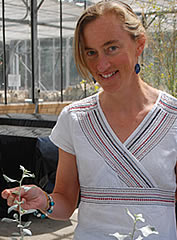
'University gave me more confidence in myself and a belief that I could do what I wanted if I applied my skills and knowledge'
Sarita Bennett
Current role
I am currently employed by Curtin University (Perth, Australia) as a Senior Lecturer in Farming Systems Agronomy. This involves teaching and research.
On completion of my PhD I was offered a post-doc at the University of Western Australia (UWA) (1995), based at the Cooperative Research Centre (CRC) for Legumes in Mediterranean Agriculture where I focussed on the ecogeography of pasture and grain legumes for southern Australian agriculture. In 2001 I took up a research position with the CRC for Plant-Based Management of Dryland Salinity (UWA) looking at the potential of using perennial plants to mitigate salinity. In 2003 I moved to the University of Wales Bangor as an agronomy scientist looking at the potential of developing flax and hemp fibre industries for North Wales.
In 2006 I moved back to Perth, Australia with the Future Farm Industries CRC, UWA to investigate the potential of developing a saltland capability assessment for farmers to determine what plants that could grow economically on their saltland. In 2010 I moved to Curtin University where my main area of research is salt and boron tolerance of legumes and cereals.
Outline the course you studied at the University of Birmingham and how it benefited you?
I completed a BSc (Joint Hons) in Biological Sciences and Geography focussing on the ecological side in both subjects. My course has benefited my future work as the biology gives me experience in looking at the details, whilst the geography background enables me to look at the big picture.
How did you find your first year in Birmingham?
My first year was quite hard as I did not know anyone else at Birmingham and was not close to home. I was also quite ill for much of my first year which made socialising hard. However, I persisted and thoroughly enjoyed my 2nd and 3rd years.
How did going to University as a whole benefit you?
Going to University has given me many more skills which I have applied in the workforce than just knowledge in my subject areas. I would not have been given the opportunities to work overseas without my degree and subsequent PhD, but university also gave me more confidence in myself and a belief that I could do what I wanted if I applied my skills and knowledge.
How did you find campus life?
I enjoyed campus life and joined a number of clubs, plus spent a lot of time at the sports centre. I used to occasionally either walk or get the train into the city. I was happier being at a campus university rather than being in the city centre.
How did you find living in Birmingham?
I enjoyed it and was an active part of the student community being on the committees of both the Scout and Guide Club and the Life-saving Club. I am not sure if I had any expectations before I left. I did not know anyone else who had gone to university and coming from a country location, life in any city was going to be very different.
Did you join any student societies during your studies?
I was a member of the Scout and Guide Club and the Life-saving Club throughout my time at University, and also joined the Duke of Edinburgh Award Club and the Wayfarers clubs for some of my time.
Any tips to pass on to students thinking of coming here?
Enjoy your time at Birmingham. The friends you make at University will be friends for the rest of your life, where ever you end up in the world. Getting good grades is important, but so is enjoying your time and it is balancing life that is an important skill to develop for both university life and when you enter the workforce.
What are your aspirations for the future?
I am happy where I am at the moment. I enjoy the mix of teaching and research, and working in the University system enables me to balance small children and satisfying work.